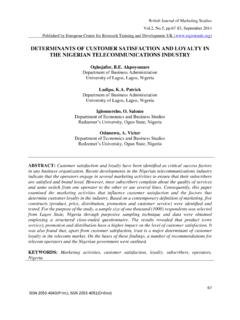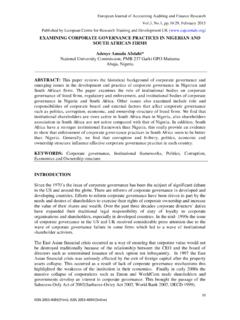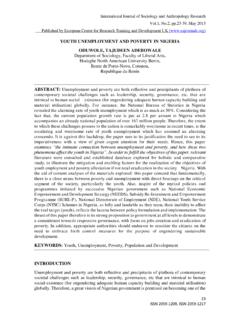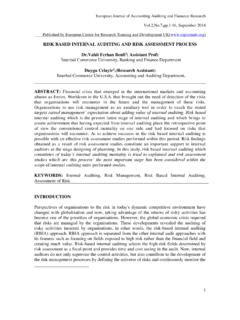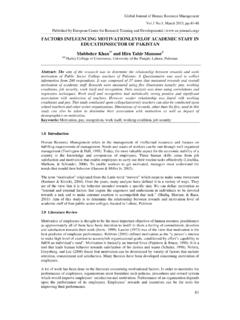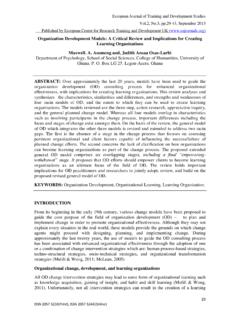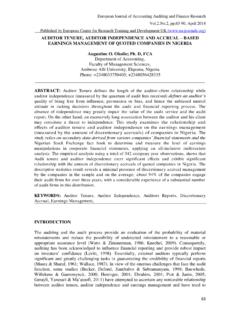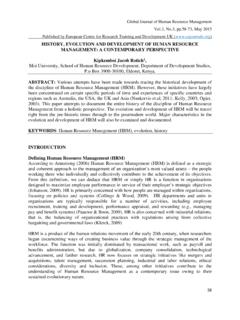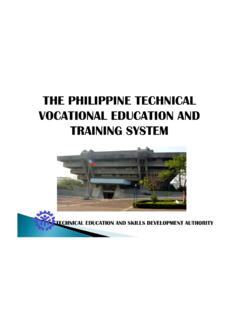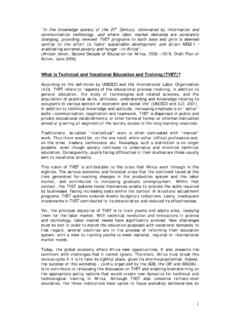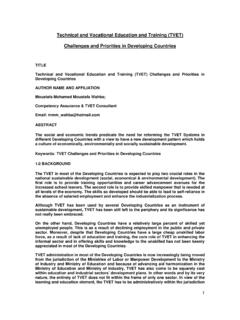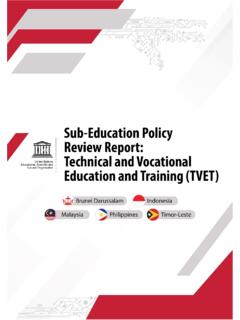Transcription of IMPACT OF VOCATIONAL AND TECHNICAL EDUCATION …
1 International Journal of VOCATIONAL and TECHNICAL EDUCATION Research , , , May 2016 ___Published by European Centre for Research Training and Development UK ( ) 15 ISSN: 2059-1187, ISSN 2059-119 IMPACT OF VOCATIONAL AND TECHNICAL EDUCATION ON LIVELIHOOD SUSTENANCE AND ECONOMIC DEVELOPMENT IN NIGERIA: THE ART WORKSHOP EXPERIENCE Dr. Ayo Elebute1 and Mashood, O. Shagaya2 1 Department of Mass Communication, Igbinedion University, Okada, Edo State, Nigeria 2 Department of Industrial Design, Ahmadu Bello University, Zaria, Kaduna State, Nigeria ABSTRACT: The focus of this study is basically on the IMPACT that VOCATIONAL and TECHNICAL EDUCATION has on livelihood sustenance and Economic development in Nigeria, using the art workshop training centres as a case study most especially the one established by the Nigerian foremost printmaker: Bruce Onobrakpeya in his home town at Agbarha-Otor, in Delta State of Nigeria.
2 The VOCATIONAL and TECHNICAL EDUCATION opportunities were divided into three broad categories the first is the training offered in private institutions under the entrepreneurship programmes, the second is the training established by governments through formal tertiary institutions such as: the Polytechnics and Colleges of EDUCATION and the third is the training sponsored by non-governmental organizations (NGOs), private individuals and/or religious organizations-the art workshop experiments organized in Nigeria at Oye-Ekiti, Osogbo, Ile-Ife, Lagos and Agbarah-Otor fall under the last category. It has been observed that the non-payment approach adopted by the organizers under the third category has been making VOCATIONAL training programmes more effective, efficient, competitive, flexible and responsive in any community where they are being organized.
3 The conclusion is that the organizers of VOCATIONAL /art-workshop centres in Nigeria have been focusing on how to satisfy the basic physiological needs of the participants while training, mentoring and motivating them for self development and self fulfilment. KEYWORDS: VOCATIONAL and TECHNICAL EDUCATION , Livelihood Sustenance, Economic, Development, Art Workshop, Self-development INTRODUCTION Art is a vocation that can be learned both at the formal tertiary institution and at the informal workshop centre. VOCATIONAL and TECHNICAL EDUCATION within the context of this definition can therefore be conceptualized as an alternative training programme that is designed mostly to improve the employability of participants and also to empower them with work readiness skills. The aim of such training programme has been to support participants inclusion into labour force.
4 Based on this fact, it can be reiterated that the need to link VOCATIONAL and TECHNICAL EDUCATION programme to economic opportunities within the context of livelihood sustenance is highly imperative in academic scholarship. The VOCATIONAL and TECHNICAL training for employment involves accelerated learning and Cole (2002) has assumed that such learning is a complex process of acquiring knowledge, understanding, skills and values in order to be able to adapt to the environment in which we operate. It is, therefore, apposite to state that these two types of educational system: VOCATIONAL and TECHNICAL are mainly designed to lead participants to acquire life skills, know-how and understanding that are essential for employment in a particular field of human endeavour. The International Journal of VOCATIONAL and TECHNICAL EDUCATION Research , , , May 2016 ___Published by European Centre for Research Training and Development UK ( ) 16 ISSN: 2059-1187, ISSN 2059-119 design of this educative programme for livelihood sustenance is based on learning system in which both the soft and hard skills are developed by the organizers within a delivery framework that seeks to promote the inclusion of individuals that participate in the programme in national employment schemes.
5 In most countries of the world, the VOCATIONAL and TECHNICAL EDUCATION schemes are developed to make underprivileged citizen believe that they have a future. Noticeably, the schemes have provided a means of reducing the psychological IMPACT of socio-political and economic trauma that is bedevilling most third world countries. It has been observed from myriads of studies that if the youth of a country fail to acquire VOCATIONAL skills there are that tendencies of becoming caught up in the web of economic dependency, juvenile delinquency, social aggression and/or depression and hopelessness. This above observation has been the greatest cause of thuggery, hooliganism and prostitution for most youth who have failed in their search of basic sustenance or lack sufficient protection to avoid being lured into such precarious activities that are mentioned above. The VOCATIONAL and TECHNICAL EDUCATION opportunities being articulated in this study can be divided into three broad categories: (1) training offered in private institutions under the entrepreneurship programmes (2) training established by governments through formal tertiary institutions such as: the Polytechnics and Colleges of EDUCATION and (3) training sponsored by non-governmental organizations (NGOs), private individuals and/or religious organizations-the art workshop experiments organized in Nigeria at Oye-Ekiti, Osogbo, Ile-Ife, Lagos and Agbarah-Otor fall under the last category.
6 The private training organizers mostly charge fees and this tuition payment approach has been limiting access to VOCATIONAL training programmes. Such fees paying VOCATIONAL programmes are organized due to limited space in nationally-operated institutions and as a result of a need to fill the gaps between the supply and demand for VOCATIONAL and TECHNICAL EDUCATION programmes. The government/public operated training programme may or may not charge fees and if it does the charges are usually nominal, that is, paltry. These negligible fees can equally serve to limit accessibility to the underprivileged groups. In most cases this type of public initiated programme requires the participants completing a formal EDUCATION at both the elementary and secondary levels before gaining opportunity for participation and this can also serve to limit accessibility of the underprivileged groups in the society.
7 The NGOs or individuals/religious bodies operated training programmes almost never charge fees and they are often targeted at the underprivileged groups and it has been observed that this non-payment approach has been making VOCATIONAL training programmes under this arrangement more effective, efficient, competitive, flexible and responsive in any community where they are being organized. The purpose of this study is to showcase how VOCATIONAL and TECHNICAL EDUCATION schemes have impacted positively on the livelihood sustenance and economic development of artists residing in Nigeria with particular reference to myriads of art workshop programmes organized in different parts of the country, most especially the one established by the Nigerian foremost printmaker: Bruce Onobrakpeya in his home town at Agbarha-Otor, in Delta State of Nigeria. The classical allusion to Onobrakpeya s artistic exploits and workshop practice has made a study in this important area of human livelihood sustenance and economic development mandatory as it will highlight the on-going mentoring strategies that are being used in modern day VOCATIONAL and TECHNICAL training.
8 International Journal of VOCATIONAL and TECHNICAL EDUCATION Research , , , May 2016 ___Published by European Centre for Research Training and Development UK ( ) 17 ISSN: 2059-1187, ISSN 2059-119 Eight keywords have been italicized in the body of this introductory section as glossary of terms to be defined operationally in order to put this present study on the import of VOCATIONAL and TECHNICAL EDUCATION in the right perspective. The words are (1) Alternative training (2) Work readiness skills (3) VOCATIONAL and TECHNICAL training for employment (4) Accelerated learning (5) Life skills (6) Livelihoods (7) Entrepreneurship and (8) Formal EDUCATION . Alternative training is a training programme that is not typically practiced in conventional formal western EDUCATION based public school. The programme responds to a range of youth development needs, including social integration, crime prevention, democracy building and workforce development, among many others.
9 Such programme is characterized by creativity and by a profusion of partnership from civil society, private business and volunteers. It is not part of national EDUCATION strategies so unconventional approaches and methodologies are adopted to make it work effectively. Work readiness skills involve aptitudes, talents, knacks and gifts that assist the youth in finding and obtaining employment, such as the skill to describe artfulness, adroitness, abilities, artistry and interest, set career goals and objectives, write a resume, search for a job, and contact employers (EDC, 2012). VOCATIONAL and TECHNICAL training for employment involves the creation and sustenance of career-enhancing EDUCATION and training programmes that are responsive to the current and future labour needs of local, regional and international employers, both formal and non-formal. Accelerated learning is a form of programme that allows youth to complete a number of years of EDUCATION in a shorter time of period: often used in emergency situations.
10 The methods used in this system of learning are learner-centred and participatory, and often help learners to discover information and knowledge on their own (Baxter and Bethke, 2009). Life skills are sometimes refer to as soft skills which, according to Naudeau et al (2008), fall into three basic categories: (1) social or interpersonal skills that include communication, negotiation and refusal skills, assertiveness, cooperation and empathy (2) cognitive skills that involve problem solving, understanding sequences, decision making, critical thinking and self-evaluation and (3) emotional coping skills that include positive sense of self and self-control that is used in managing stress, feelings and moods. Livelihoods are the jobs or other sources of income that give one the money to buy things needed for survival or sustenance. They are the means of support or subsistence.

